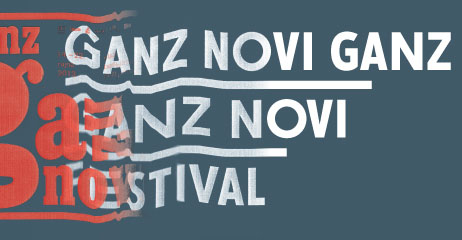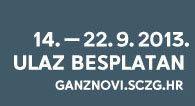Mirela Ivičević, biography / interwiev
The composer Mirela Ivičević (Split, 1980) graduated Composition from the Academy of Music in Zagreb and she finished her postgraduate studies at Universität für Musik und darstellende Kunst in Wien. She is the author of acoustic, electroacoustic and intermedia works, sound installations, music for film and theatre, and two operas (The Threefairlady Opera, MBZ 2007 and Karussell, ISCM/WienModern 2013). The majority of her works are conceptual and interdisciplinary works, dealing primarily with the role of sound in social and political context, in which she often uses acoustic side effects of modern society.
Her works have been performed all over Europe, North and South America. She won University of Zagreb’s Rector’s Prize (Phantom no.3, 2004), Theodor Körner Prize (Ace of diamonds, 2010), Rudolf Matz Prize (2010), as well as ISCM Prize for her Vocaltheater Composition (Gender)Bender 9,99 (2011). In collaboration with Gordan Tudor, she has been organizing the international festival of contemporary music Dani Nove Glazbe Split since 2010.
INTERVIEW
G: Where are you starting from and how?
MI: I am interested in the reflective and subversive potential of sound, be it a basic or accompanying part of the concept. My sound fiction is made of fractions of reality, taken away from their natural environment into the surreal world in which they are laid bare, twisted, questioned, laughed at…, and linked into new sound constellations that have a potential to offer alternative visions of the same thing they were made of.
My starting point is always real life, that is, its elements I want to re-examine or change, and as it seems the fairest to start from myself, I often deal with the phenomena I am somehow a part of.
Music has always fascinated me with its power of influence on human psyche, despite its high level of fluidity and abstraction, and especially its power to modify and intensify the influence of other means of expression. This often leads me to the theatre and interdisciplinary projects. However, for me, more important than the medium itself is the reason I use it. I do not see the sound as a means to escape, but as a means of struggle, that is why I prefer contemporary music, just like art in general, which radically fights for the right to both physical and mental freedom, diversity and life without dogmatic pollution.
G: Which way are you going?
MI: Various influences are interwoven in my path. I think that the most useful things one can learn from any art studies are: the part of technical knowledge that will enable you to express more easily what you want, and even more important – disobedience towards authority and any other self-evidences.
During my composition and media-composition studies I was lucky enough to learn from people who share the same attitude, so I escaped the traps of academism and my archive of audio influences is devoid of stylistic and similar divisions. Depending on the specific idea, the result of my efforts is often a patchwork of audio extremes.
I have gained a lot of knowledge and inspiration through intensive collaboration with other artists, but also from the most common everyday situations and contact with people who have nothing to do with music. Although working with sound is most exciting when its specificities are in foreground, I learned a lot about composing in contact with other branches of the arts, especially film. Of course, there is nothing like learning from one’s own mistakes. But I think that more important than the path one is taking and people one meets on the way is to find the optimal balance between open mindedness and critical spirit. Such path is the most exciting and the most constructive.
G: Where are you going to?
MI: I am interested in a “fighting“, socially conscious music, the one which does not settle for mere function of entertaining, although I do not have anything against that type of music, but it is not worthy of life commitment.
Musical semantics has special powers I want to examine, but also limitations that are one of the reasons I often work with text and visual elements, and I do not limit myself to just one medium.
I prefer to work with people with whom I share the same objectives and we complement each other in our ideas, expertise and approaches. In such circumstances I feel equally good both in dominantly musical projects and in the ones in which I deal with the applied sound.
I am attracted to any situation in which I have the chance to re-examine all the options, thus I am delighted that the projects I am working on are often completely different from each other. Recently in Vienna, with a group of artists with completely different backgrounds, I formed Moment Collective, an ensemble for experimental music, audio-visual and performance arts, which I hope will become a polygon for re-examining all options. I am trying to do something similar in the case of New Music Days Split Festival, where I am collaborating with Gordan Tudor, especially with regard to Split’s audio but also general-social status quo which chronically lacks diversity.
It is not important that everybody likes the sound I create, I want to offer a choice, not to teach, but to mention that there is always more than one path.

